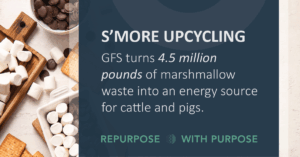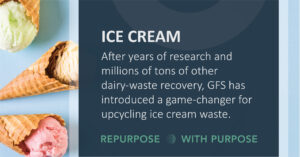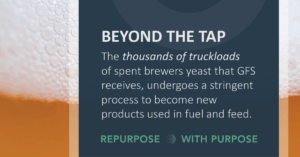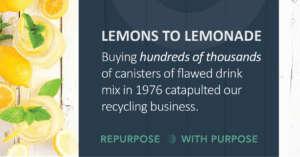At Green Field Solutions, reducing food waste is always in season—because sustainability doesn’t take a summer vacation. We give summertime favorites a second chance through innovative upcycling solutions that keep valuable food by-products out of landfills and in the food supply chain.
Circular Solutions for Sustainable Summer Eats
 Sure, some food waste is inevitable—Timmy’s half-eaten hot dog, a bag of chips claimed by the neighbor’s puppy, or those marshmallows lost to the campfire. On a micro scale, households can compost and take other measures to reduce food waste at home. On a macro scale, GFS partners with food manufacturers to recover production by-products—minimizing excess, reducing waste, and finding sustainable uses for materials that would otherwise be sent to landfill.
Sure, some food waste is inevitable—Timmy’s half-eaten hot dog, a bag of chips claimed by the neighbor’s puppy, or those marshmallows lost to the campfire. On a micro scale, households can compost and take other measures to reduce food waste at home. On a macro scale, GFS partners with food manufacturers to recover production by-products—minimizing excess, reducing waste, and finding sustainable uses for materials that would otherwise be sent to landfill.
Feed our food. Feed more people.
We love all the sustainable summer fixin’s as much as anyone else, which is why we’re committed to creating circular solutions for the by-products of our favorite snacks and drinks. In the production process, valuable materials like potato peels, spent grains, broken crackers, and misshapen marshmallows often get sidelined. We give them a new life by transforming commercial-scale food waste into animal feed ingredients. This helps feed people and animals more sustainably while reducing the global carbon footprint.
From Disposal to Diversion
At GFS, we know summer foods are worth saving—because whether it’s snacks, s’mores, brews, or lemonade, there’s always a second chance to feed our food and feed more people.

Snacks - Crunching the numbers
Each year, GFS manages over 50 million pounds of chips and salty snack by-products. By recognizing the value in these materials, we’ve helped improve the returns for snack manufacturers while diverting perfectly usable food from waste streams.

S'Mores - The Super Recyclers
Our animal nutritionists develop innovative feed ingredients, transforming chocolate co-products into piglet feed and turning excess marshmallows into energy sources for cattle and pigs. GFS handles approximately: 12 million pounds of graham crackers, 12 million pounds of chocolate and candy bars, and 4.5 million pounds of marshmallows.

Ice Cream - A Cool Game Changer
Expired or near-date dairy products like milk and ice cream often are destroyed or discarded at the retail site. Until now, few options were available to food manufacturers and retailers to keep ice cream waste from hitting the landfill or being land spread.

Beer - Brewing Better Outcomes
For every one million liters of beer brewed, producers generate an estimated 15-18 tons of surplus yeast. GFS processes over 21,000 tons of spent brewer’s yeast annually, converting it into tasty ingredients in pet food as well as high-quality ethanol—turning a waste challenge into a sustainable solution.

Lemonade - The Original Upcycle
In the 1970s, skyrocketing sugar prices left feed producers scrambling for affordable sweeteners. Around the same time, a drink company's massive production error left it with hundreds of thousands of canisters of unsellable powdered lemonade mix. Our founder recognized the opportunity, which launched our long-standing commitment to food recovery and recycling.

